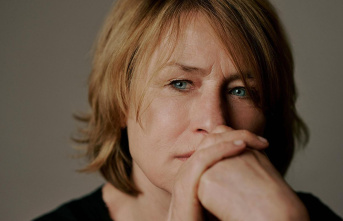"Do you have some time for me? Then I'll sing you a song about ninety-nine balloons on their way to the horizon" - the beginning of "99 balloons", the most famous song by the band Nena, can certainly be sung by most people who are in the grew up in the 1980s.
The song about the balloons, which a general thought were UFOs from space and therefore sent a squadron to follow them, is one of the best-known hits of the Neue Deutsche Welle (NDW). The song, which first appeared in the German single charts on January 24, 1983, was also successful worldwide and even stormed the charts in the USA.
Balloons fly over the Berlin Wall
The idea for the lyrics came to band guitarist Carlo Karges in 1982 at a Rolling Stones concert in West Berlin, when Mick Jagger released balloons at the end of the show, which the wind carried towards the Wall. "Back then, with this strong picture, Carlo asked himself what could happen if someone misunderstood it," singer Nena remembers today. He wrote the text that same night.
A little later, the band's keyboardist, Uwe Fahrenkrog-Petersen, had a melody in his head as he drove to the rehearsal room in the car. He was rehearsing it there with drummer Rolf Brendel and bassist Jürgen Dehmel, when Karges came in and said he had written lyrics that fitted the tune exactly.
To this day, the song is one of the best-known German songs in the English-speaking world - and it also has a special meaning for the singer Nena. "I love this song. As long as I'm on stage, there will be no Nena concert without the balloons," she tells the German Press Agency. "We've been traveling the world together for 40 years and have experienced a lot together."
The song fit the time perfectly
She had only stumbled over the line "See the world in ruins" before. "It was just two little words it took. Since then I've been singing, 'I don't see the world in ruins yet!' - It's in our hands. I believe in us humans and trust that deep in our Hearts know: We belong together."
When the song was released in 1983 after the band's first hit "Nur dreamed" (1982), it was the last phase of the Cold War. After the NATO double-track decision, the stationing of medium-range nuclear missiles began in Germany in 1983. The people fought back against this threat and organized themselves in the peace movement, there were large demonstrations against the planned rearmament.
"The "99 Luftballons" simply fit into the time. On the one hand, the theme of peace was present in the song - but without really formulating protest or calling for political resistance. On the other hand, the Neue Deutsche Welle was at its peak, it even conquered the hit parade in the ZDF," says Prof. Michael Fischer, director of the Center for Popular Culture and Music at the University of Freiburg.
"As soon as I read the first lines, a shiver ran down my spine and I wanted to sing it immediately. From then on it was unstoppable," says Nena. The record company said at the time that the song had "no chorus" and was "not commercial enough".
To number one in the UK charts
The success of "99 Luftballons" in the USA was similarly magical: when Christiane Felscherinow was in Los Angeles to promote the film "Christiane F. - Wir Kinder vom Bahnhof Zoo", she was a guest on the show of the well-known radio host Rodney Bingenheimer. When the moderator asked her about the trends in Germany, she handed him a cassette with "99 balloons".
Bingenheimer liked the song so much that he put it on more often. Other radio stations and the music station MTV followed. The song soon became a huge hit not only in the US, but also in Japan, Mexico, Canada and Australia. In 1984, the English-language version ("99 Red Balloons") made it to number one in the UK charts.
"The Nena song is not only part of the history of the Neue Deutsche Welle, but of German political and cultural history in general. The fact that the song was often understood less politically, but danced, laughed and sang along, does not reduce its historical importance," says Fischer . Similar to "A Little Peace", with which pop singer Nicole won the Grand Prix Eurovision de la Chanson in 1982, the song addresses people's desire for peace. "And given today's wars, especially since Russia's attack on Ukraine, it should be all too clear that peace is the central value of humanity alongside justice," says the music expert.
And for the singer Nena herself, the song has not lost a moment of its truthfulness and topicality. "In all the countries where we played concerts, the balloons were understood as a message of peace. And peace is and will always be relevant for us as a human family on this earth."











